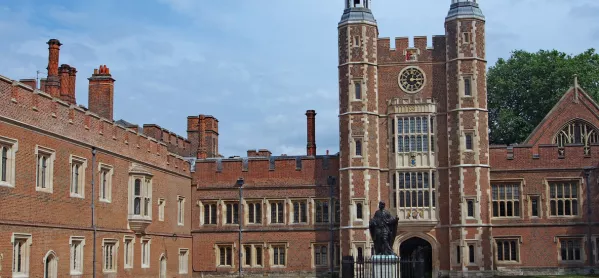- Home
- Analysis: Would Eton move abroad to escape Labour?
Analysis: Would Eton move abroad to escape Labour?

The last time Labour seriously mooted abolishing independent education back in the 1980s, there were rumours that England’s elite public schools would simply move overseas.
So with the Labour party conference last week voting to redistribute all private school assets to state schools, have more plans been hatched for the likes of Eton and Harrow to escape the clampdown by re-opening abroad?
Survey: Two-thirds of public support independent education
Quick read: Labour votes to abolish private schools
Background: Elite five times more likely to have private education
Barnaby Lenon, chair of the Independent Schools Council (ISC) and a former head of Harrow and Eton, discourages the idea that there will be any widespread relocation.
But he tells Tes: “Businesses will think about this [moving abroad] and so schools might also have that discussion. It would be easier [than a day school] for a boarding school in terms of resources to move to Dublin or Paris or even Calais.
“If a school’s going to effectively be abolished, it would be very surprising as a full boarding school for them not to consider the option of moving to a jurisdiction with a more benign environment.”
Impact felt by smaller schools
But would a Labour government actually proceed with a plan to effectively seize private school assets? Even shadow chancellor John McDonnell has appeared to back away from the idea.
What is more probable, according to Sam Macdonald, an education lawyer with Farrer & Co, is that Labour will look at imposing VAT on school fees and business rates, and he says schools may find this tricky to challenge.
“Neither disrupts the general system of UK charity reliefs, and business rates is entirely domestic,” he says. “In theory, there could be a challenge based on human rights legislation but I suspect it may be quite difficult to sustain.”
According to Lenon, VAT changes are likely to impact smaller, low-cost independent schools catering to younger children the most. But he thinks the larger public schools - the kind that might have the resources to move abroad - would remain largely unscathed by the tax change.
Nonetheless, many schools are troubled and are now seeking legal advice. Kristine Scott, an education lawyer at Harrison Clark Rickerbys, takes a different view to MacDonald and says a Labour government would face “significant legal hurdles if this policy were to come into effect”.
She said schools could use charity law to argue that they were being prevented from helping their beneficiaries - their pupils - and there would be legal questions over the transfer of schools’ assets to the state.
A further issue is that not all independent schools have charitable status - some are run by private proprietors. And it would be a very different issue stripping assets from businesses.
‘I’ve put my whole life on the line’
Matthew Adshead, head of the Old Vicarage School, which he runs as a private business, said: “The independent sector is a very broad church. You have the Etons and the Harrows and ISC schools, and then you have the ISA [Independent Schools Association]. Just over 50 per cent of ISA schools are under private proprietorship.”
“I’ve put my whole life on the line as an individual proprietor. The only historical example of this I can think of is the dissolution of the monasteries.”
But do Labour’s main players in really want that to happen anyway? When asked about the idea at the weekend Angela Rayner, shadow education secretary, chose to emphasise her support for a “comprehensive state education system” and ending subsidies for private schools rather than talking about abolishing them and redistributing their assets. The party would “obviously act within the law”, she said.
Macdonald notes that it is tricky to “bomb-proof” independent schools when Labour’s proposals remain contradictory and unclear. And a source close to shadow education ministers admitted to Tes that the party’s conference motion “doesn’t make any sense”.
For example, it calls for measures such as a 7 per cent cap on private school students in university admissions, while at the same time calling for the sector’s complete abolition. But how would one cap admissions from schools that no longer exist?
Keep reading for just £1 per month
You've reached your limit of free articles this month. Subscribe for £1 per month for three months and get:
- Unlimited access to all Tes magazine content
- Exclusive subscriber-only stories
- Award-winning email newsletters


